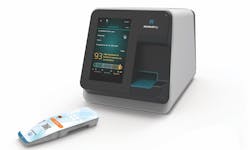MeMed, based in Haifa, Israel, said the U.S. Food and Drug Administration (FDA) has granted 510(k) clearance for use of an assay and testing platform to help healthcare providers distinguish between bacterial and viral infections.
The technology, which has been cleared for both children and adults, is called MeMed MV, which runs on the MeMed Key platform, which the company describes as a “point of need,” or point of care, device.
Bacterial and viral infections are often clinically indistinguishable, leading to the prescription of antibiotics for the treatment of viral infections, for which they are ineffective. Antibiotic misuse drives the emergence of antimicrobial resistance (AMR).
MeMed’s technology decodes the body’s immune response to infection, the ‘host response’, rather than focusing on detecting the presence of a microbe. The company says that this allows for diagnosis even when the infection site is inaccessible or unknown or when the pathogen is undetectable using conventional tests, or when the cause of infection are emerging new pathogens.
MeMed BV measures and computationally integrates the levels of three immune system proteins: TRAIL, IP-10 and CRP. When run on the MeMed Key platform, MeMed BV provides a result within 15 minutes.
FDA clearance was based on a multi-center blinded clinical validation study enrolling over 1,000 children and adults and addresses goals laid out in the US National Action Plan for Combating Antibiotic Resistant Bacteria. The test provides highly accurate results with Area Under the Curve of 90% and 97% (primary and secondary endpoints).
MeMed has established its U.S. base in Boston and is ramping up commercial activities.

